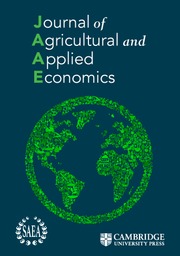Crossref Citations
This article has been cited by the following publications. This list is generated based on data provided by
Crossref.
Nijs, Luc
2014.
The Handbook of Global Agricultural Markets.
p.
63.
Morton, Lois Wright
Hobbs, Jonathan
Arbuckle, J. Gordon
and
Loy, Adam
2015.
Upper Midwest Climate Variations: Farmer Responses to Excess Water Risks.
Journal of Environmental Quality,
Vol. 44,
Issue. 3,
p.
810.
Thareau, Bertille
Fabry, Mathilde
and
Robin, Arnaud
2015.
Lutter contre le changement climatique ou pour son identité professionnelle?.
VertigO,
Vol. 14-3,
Issue. ,
Lengnick, Laura
Miller, Michelle
and
Marten, Gerald G.
2015.
Metropolitan foodsheds: a resilient response to the climate change challenge?.
Journal of Environmental Studies and Sciences,
Vol. 5,
Issue. 4,
p.
573.
Prokopy, Linda S.
Arbuckle, J. G.
Barnes, Andrew P.
Haden, V. R.
Hogan, Anthony
Niles, Meredith T.
and
Tyndall, John
2015.
Farmers and Climate Change: A Cross-National Comparison of Beliefs and Risk Perceptions in High-Income Countries.
Environmental Management,
Vol. 56,
Issue. 2,
p.
492.
Monroe, Martha C.
Plate, Richard R.
Adams, Damian C.
and
Wojcik, Deborah J.
2015.
Harnessing homophily to improve climate change education.
Environmental Education Research,
Vol. 21,
Issue. 2,
p.
221.
Menapace, Luisa
Colson, Gregory
and
Raffaelli, Roberta
2015.
Climate change beliefs and perceptions of agricultural risks: An application of the exchangeability method.
Global Environmental Change,
Vol. 35,
Issue. ,
p.
70.
Wilke, Adam K.
and
Morton, Lois Wright
2015.
Climatologists’ Communication of Climate Science to the Agricultural Sector.
Science Communication,
Vol. 37,
Issue. 3,
p.
371.
Lengnick, Laura
2015.
The vulnerability of the US food system to climate change.
Journal of Environmental Studies and Sciences,
Vol. 5,
Issue. 3,
p.
348.
HOQUE, MOHAMMAD MAINUL
ARTZ, GEORGEANNE M.
JARBOE, DARREN H.
and
MARTENS, BOBBY J.
2015.
PRODUCER PARTICIPATION IN BIOMASS MARKETS: FARM FACTORS, MARKET FACTORS, AND CORRELATED CHOICES.
Journal of Agricultural and Applied Economics,
Vol. 47,
Issue. 3,
p.
317.
Sanderson, Matthew R.
and
Curtis, Allen L.
2016.
Culture, climate change and farm-level groundwater management: An Australian case study.
Journal of Hydrology,
Vol. 536,
Issue. ,
p.
284.
Torabi, Nooshin
Cooke, Benjamin
and
Bekessy, Sarah A.
2016.
The Role of Social Networks and Trusted Peers in Promoting Biodiverse Carbon Plantings.
Australian Geographer,
Vol. 47,
Issue. 2,
p.
139.
Chatrchyan, Allison M.
Erlebacher, Rachel C.
Chaopricha, Nina T.
Chan, Joana
Tobin, Daniel
and
Allred, Shorna B.
2017.
United States agricultural stakeholder views and decisions on climate change.
WIREs Climate Change,
Vol. 8,
Issue. 5,
Roesch-McNally, Gabrielle E.
Gordon Arbuckle, J.
and
Tyndall, John Charles
2017.
What would farmers do? Adaptation intentions under a Corn Belt climate change scenario.
Agriculture and Human Values,
Vol. 34,
Issue. 2,
p.
333.
Valliant, Julia C.D.
Farmer, James R.
Dickinson, Stephanie L.
Bruce, Analena B.
and
Robinson, Jennifer Meta
2017.
Family as a catalyst in farms' diversifying agricultural products: A mixed methods analysis of diversified and non-diversified farms in Indiana, Michigan and Ohio.
Journal of Rural Studies,
Vol. 55,
Issue. ,
p.
303.
Tobin, Daniel
Radhakrishna, Rama
Chatrchyan, Allison
and
Allred, Shorna B.
2017.
Addressing Climate Change Impacts on Agriculture and Natural Resources: Barriers and Priorities for Land-Grant Universities in the Northeastern United States.
Weather, Climate, and Society,
Vol. 9,
Issue. 3,
p.
591.
Ndamani, Francis
and
Watanabe, Tsunemi
2017.
Determinants of Farmers’ Climate Risk Perceptions in Agriculture—A Rural Ghana Perspective.
Water,
Vol. 9,
Issue. 3,
p.
210.
Mase, Amber Saylor
Gramig, Benjamin M.
and
Prokopy, Linda Stalker
2017.
Climate change beliefs, risk perceptions, and adaptation behavior among Midwestern U.S. crop farmers.
Climate Risk Management,
Vol. 15,
Issue. ,
p.
8.
Houser, Matthew
Stuart, Diana
and
Carolan, Michael
2017.
Is seeing believing? Applying a realist framework to examine agriculture and climate change.
Environmental Sociology,
Vol. 3,
Issue. 4,
p.
321.
Mitchell, Paul D.
Brown, Zachary
and
McRoberts, Neil
2018.
Economic issues to consider for gene drives.
Journal of Responsible Innovation,
Vol. 5,
Issue. sup1,
p.
S180.


